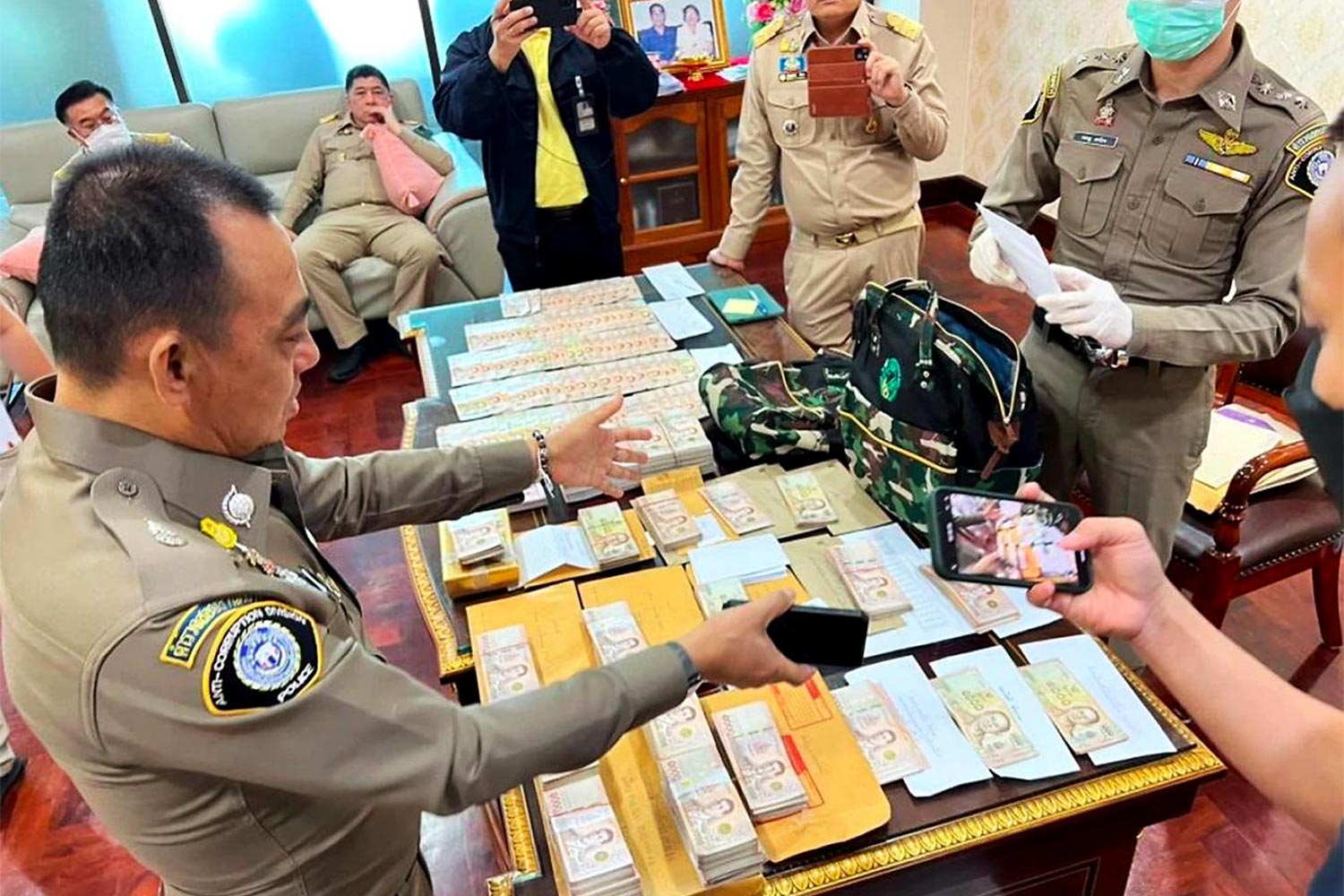
Pol Maj Gen Jaroonkiat Pankaew, commander of the Anti-Corruption Division (ACD), has vowed to turn the agency into a high-calibre unit combatting corruption.
The ACD was thrust into the spotlight recently after a team of its officers on Dec 27 arrested Rutchada Suriyakul Na Ayutya, the director-general of the Department of National Parks, Wildlife and Plant Conservation, on suspicion of demanding or taking bribes from subordinates and malfeasance.
An envelope containing 98,000 baht was found during the arrest at the department chief's office, while envelopes containing another 4.9 million baht with the names of subordinates on them were found in Mr Rutchada's safe, according to the ACD.
A probe is underway, which also covers the actions of other department chiefs who may be complicit in a culture of demanding or receiving bribes.
In the past, the ACD was dubbed "the graveyard" as officers who committed offences were banished there as a punishment, according to Pol Maj Gen Jaroonkiat.
"Few were willing to work here. Some officers worked here because they wanted to add to their job credentials and then sought transfers to other units,'' Pol Maj Gen Jaroonkiat said.
"Some saw the ACD as a stopover where they stayed temporarily before moving on to other careers such as lawyers or judges," he said.
"At the time, the ACD was also understaffed and poorly funded. As such, the level of efficiency was low," Pol Maj Gen Jaroonkiat said.
"When I stepped in, I made a lot of changes to ensure the ACD had a more active role.
"I don't want it to be a paper tiger, so steps are being taken to reinvigorate and empower the agency,'' said Pol Maj Gen Jaroonkiat, who has served as the ACD chief for three years now.
Before taking the helm at the ACD to crusade against corrupt officials, Pol Maj Gen Jaroonkiat was widely known as a crime-buster, leading operations to clamp down on criminals and drug traffickers.
He also said Pol Lt Gen Jiraphob Bhuridej, commissioner of the Central Investigation Bureau, which oversees the ACD, has realised the need to boost the ACD's efficiency and sent additional detectives to support its work.
"I emphasise the need for all ACD officers to turn the ACD into a respectable police unit which people can rely on," he said.
After graduating from the Royal Police Cadet Academy in Nakhon Pathom's Sam Phran district, he started his career as a border patrol officer in Phetchaburi.
There, he led operations against forest encroachers, drug traffickers and those who illegally owned Sor Por Kor land-reform plots intended for poor and landless farmers for agricultural use.
He was later put in charge of a drug suppression unit attached to Border Patrol Police Region 1 in Pathum Thani, gaining further experience in anti-drug operations.
After a six-year stint serving for the border patrol police, he was transferred to the Crime Suppression Division (CSD) in Bangkok, where high-calibre officers work.
There, he had the opportunity to hone his detective and crime-solving skills and took part in investigations into several high-profile cases.
They included the fatal shooting in 2001 of a protest leader who campaigned against the Rachathewa garbage landfill in Samut Prakan's Bang Phli district, and an abortive bombing attempt on the Israeli embassy in 1994.
He rose through the ranks until he became deputy commander of the CSD and then deputy commander of the Highway Police Division before being appointed as the ACD chief holding the rank of police major general.
"The ACD has now been given new lease of life and energy as it handles several cases," Pol Maj Gen Jaroonkiat said, adding that the ACD is also working closely with the National Anti-Corruption Commission (NACC), and the Public Sector Anti-Corruption Commission to integrate anti-graft efforts.
He added that since authorities have intensified crackdowns, corrupt officials have to tread carefully.
"Still, they often leave behind evidence [inadvertently], and police use it to trace them. They cannot escape," he said.
"The ACD arrested several officials accused of demanding under-the-table payments from people seeking public services," he added.
"Corruption is like a cancer eating away at our society. Strong medicines are needed to get rid of it.
"The government and state agencies should make serious efforts to stamp out graft while the public should realise its gravity and support these efforts," Pol Maj Gen Jaroonkiat said.
He also said the ACD is equipped with technologies and forensic science to support investigations into corruption cases.
"Evidence will be gathered, CCTV footage examined, and witnesses questioned before investigation reports are forwarded to the NACC," he said.
Even though he has brought many perpetrators to justice, Pol Maj Gen Jaroonkiat said he is still not happy with his performance.
"We try to keep corruption in check. Actually, anti-graft efforts must continue non-stop because corruption undermines society," he said, adding that anti-graft laws should also be toughened to deter perpetrators.

Pol Maj Gen Jaroonkiat Pankaew, commander of the Anti-Corruption Division (ACD). (Photo: Pattarapong Chatpattarasill)